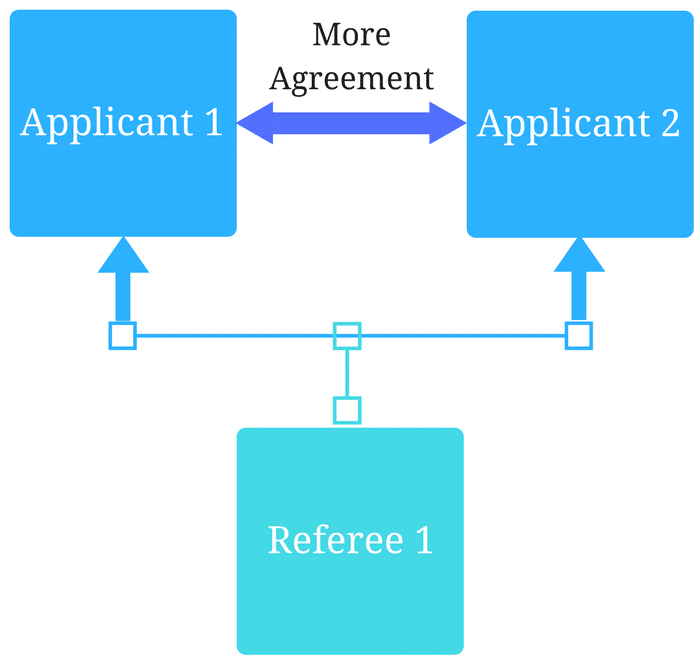Balancing Act: Writing the MSPE Letter

July 26, 2022
The purpose of the Medical School Performance Evaluation (MSPE)—equivalent to the Medical School Performance Record (MSPR) in Canada—is to provide residency program directors with an objective summary of a candidate’s relevant experiences, professional attributes, and academic performance, according to the AAMC. This may sound straightforward but in actuality, writing the MSPE can be riddled with many tensions.
In this article we examine the dilemmas of writing an effective and fair MSPE. We also talk about how data automation can simplify MSPE letter generation and address standardization dilemmas.
Where it gets complicated
In their 2021 paper “Standardization in the MSPE: Key Tensions for Learners, Schools, and Residency Programs,” Hauer et al. describe conflicting interests that make MSPE letter writing a balancing act for authors. We summarize a few of these issues below:
| Key Tension | How does it complicate the MSPE? |
| Holistic vs standardized presentation of a learner’s competencies | – For the sake of standardizing the way they describe competency among learners, MSPE authors run the risk of leaning too heavily on academic metrics as this data lends itself well to standardized presentation using easily interpretable graphs and tables. – However, an overemphasis in presenting academic metrics could lead to a less nuanced narrative about the learner’s character and professional attributes. |
| Writing for efficiency vs presenting comprehensive information for better interpretation | – In the interest of making MSPE letters easier to read for residency program directors, MSPE authors may omit pertinent information on courses, evaluations, grading systems unique to their school, as well as their educational program’s curricular strengths – Yet, program directors may also be interested in reading such details to better interpret a learner’s performance data and assess residency program fit. |
| Reporting vs advocating | – Previous studies have shown a tendency for MSPEs to underreport concerning academic issues. On an individual level, MSPE authors may feel compelled to advocate for their learners’ acceptance into a residency program, resulting in underreporting negative academic indicators. On an institutional level, reporting may be influenced by a school’s objectives for residency match rates. – The AAMC has encouraged greater accuracy in portraying learners’ competencies by replacing what was known as the ‘Dean’s letter’ with the MSPE—which puts an emphasis on performance and evaluation rather than recommendation. Yet there’s still room for improvement among schools to be more transparent about comparative performance data. |
Cutting through MSPE letter conflicts with data automation
Ultimately, improving the overall effectiveness of the MSPE as an evaluation tool for residency program matching requires a concerted effort between UME and GME. Continuous collaboration between UME and GME programs on further refining the MSPE’s purpose, content standards, and formatting will lead to greater utility and assist in improving residency match outcomes.
Simultaneously, UME programs can also simplify MSPE authorship by leaning into data management tools such as automation. In a previous article, we talked about how you can automate MSPE letter generation. Not only does automation cut through the scut work of compiling and organizing the data needed in an MSPE letter, it can also help address the tensions of MSPE standardization discussed earlier. But how?
1. Data automation as an exercise in gaining clarity
Applying data automation to MSPE letter generation can be a reflective process. Setting up automation requires you to account for all the mandatory data required by the AAMC and then determine what other data you think is also highly important to communicate to residency programs. This helps you prioritize information, cut out what’s not necessary, and shed light on what other pertinent data you might have unintentionally overlooked and would need to track in the future.
2. Data automation promotes consistency
When you automate MSPE letter generation, a draft containing all the standard data is automatically produced for authors. Whether positive or negative, all the required performance data is already reflected in the draft. From the MSPE author’s side, this eliminates any potential doubt of whether to include a piece of information or not. On a more practical note, automation also eliminates manual data entry so the letter is free of errors that might arise from copy-pasting information from other platforms.
3. Data automation frees up time for supporting learners
Manually generating the MSPE involves a lot of work sifting through information from several data sources and systems. Automation helps you cut down the scut work, freeing you up to focus more time on advising and supporting learners as they apply for residency.
Data automation is a concrete step towards standardizing MSPE letter generation. Yet, in the process of implementing data automation, authors may also produce more nuanced letters as a result of faculty efforts to refine data collection in order to capture and better reflect learners’ professional competencies alongside academic metrics. Moreover, using automation to streamline data compilation allows your staff to focus more time on supporting and advising learners.
Learn more about Acuity’s MSPE automation solution by visiting our product page. Book a demo with our team and find out how this solution can be implemented to fit your program’s needs.
Related Articles

How interviews could be misleading your admissions...
Most schools consider the interview an important portion of their admissions process, hence a considerable…
Reference letters in academic admissions: useful o...
Because of the lack of innovation, there are often few opportunities to examine current legacy…
